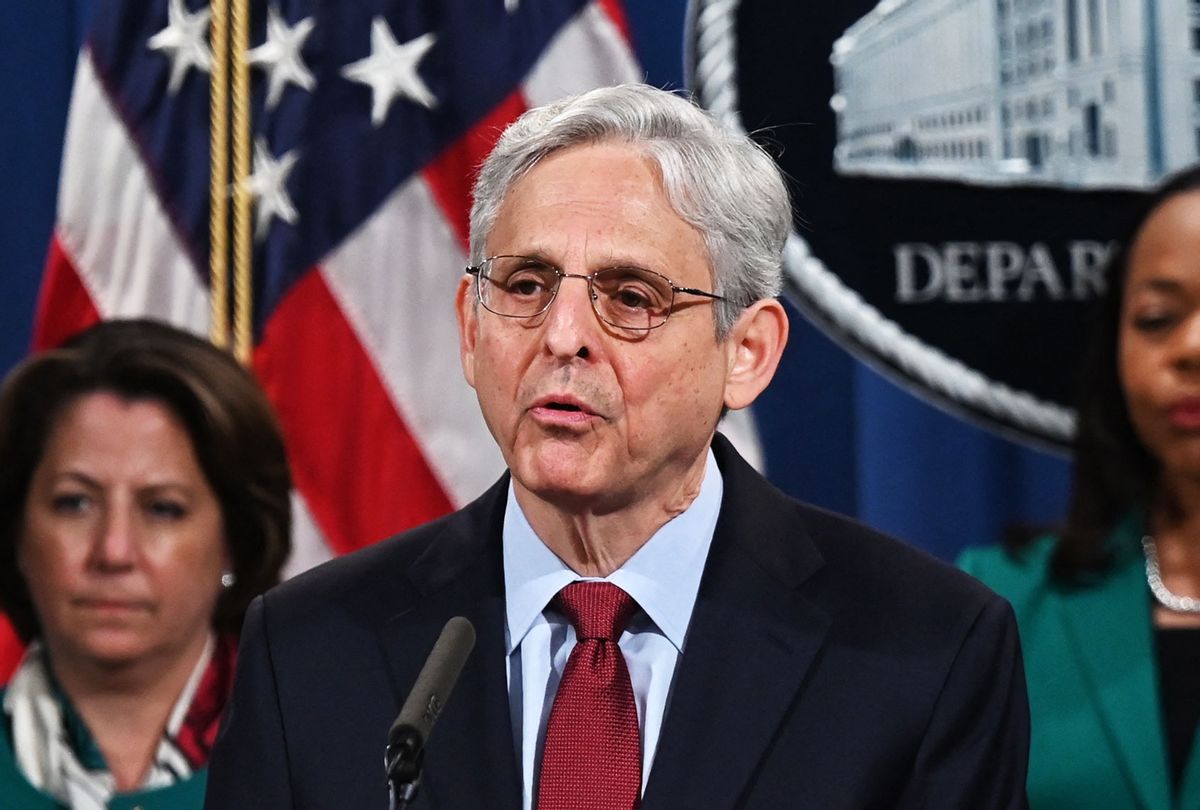The Justice Department is suing Georgia over its new voting law that Attorney General Merrick Garland said Friday was enacted with "the purpose of denying or abridging" the rights of Black Georgians in violation of the Voting Rights Act.
Garland's enforcement announcement came on the eighth anniversary of the Supreme Court's infamous Shelby County decision gutting the preclearance section of the Voting Rights Act which the Justice Department uses to target states whose new voting restrictions may violate federal law. The DOJ's Civil Rights Division says Georgia's controversial Senate Bill 202, which President Joe Biden compared to Jim Crow-era restrictions, aims to restrict the voting rights of Black Georgians "on account of their race of color, in violation of Section 2 of the Voting Rights Act."
Garland added that "Many of that law's provisions make it harder for people to vote," undercutting months of dubious Republican claims that the law did not restrict voting access. The sweeping new law includes provisions restricting absentee voting and drop-boxes, banning mobile voting buses used in the Atlanta area, imposing new voter ID requirements, criminalizing giving water or food to voters, as well as other provisions that may make it easier for Republicans in the state to overturn future elections.
Kristen Clarke, the first Black woman to head the Civil Rights Division, said Friday that "several provisions" of the law were "passed with a discriminatory purpose," noting that the legislature passed the bill through a "rushed process" and the bill quietly ballooned from a three-page bill approved by the state Senate to a 90-page law signed by Republican Gov. Brian Kemp after just two hours of debate.
"These legislative actions occurred at a time when the Black population continues to steadily increase," she said, noting that the law particularly targeted absentee voting, which Black voters are "now more likely use than white voters."
Other provisions, she said, also "were adopted with the intent" to restrict the equal voting rights of Black citizens.
"The provisions we are challenging reduce access to absentee voting at every step of the process, pushing more Black voters to in-person voting, where they will be more likely than white voters to confront long lines," Clarke said. "SB 202 then imposes additional obstacles to casting an in-person ballot."
These changes were not made "in a vacuum," she added, but "immediately after successful absentee voting in the 2020 election cycle, especially among Black voters."
Clarke cited provisions restricting the state from sending unsolicited mail ballot applications and that "irrationally" shorten both the period voters have to request and receive mail-in ballots, both of which data shows would disproportionately impact Black voters. The DOJ is also challenging a provision that "imposes substantial fines" on third party organizations like churches and advocacy groups that help voters cast ballots, she said, the provision that restricts the use of ballot drop-boxes, the measure banning food and voter for voters, and another provision that "reduces the likelihood that out-of-precinct provisional ballots will be counted."
Along with the DOJ's lawsuit, voting rights groups have filed more than a half-dozen complaints challenging provisions in SB 202. Top Democratic attorney Marc Elias, who is among those suing the state, called the DOJ announcement a "game-changer."
Kemp issued a statement accusing the Biden administration of "weaponizing" the DOJ to "carry out their far-left agenda that undermines election integrity." Georgia Secretary of State Brad Raffensperger accused the administration of doing the "bidding of Stacey Abrams" and said he looks forward to "beating them in court."
Garland and Clarke vowed to review voting restrictions in other states.
"The rights of all eligible citizens to vote are the central pillars of our democracy. They are the rights from which all other rights ultimately flow," Garland said, vowing that the department would respond to the "dramatic rise in state legislative actions that will make it harder for millions of citizens to cast a vote that counts."
Florida and over a dozen other Republican-led states have already passed sweeping voting restrictions in response to baseless fraud allegations stemming from former President Donald Trump's loss, and other states like Texas are expected to pass onerous restrictions as well.
"We are scrutinizing new laws that seek to curb voter access," Garland said. "And where we see violations of federal law, we will act."
The attorney general vowed that the lawsuit is the "first of many steps" in the Justice Department's renewed focus on ensuring that "all eligible voters can cast a vote, that all lawful votes are counted, and that every voter has access to accurate information."
Garland also called out the so-called election "audit" in Arizona and any potential future "audits," pledging new guidance to ensure they comply with federal law. The DOJ will also provide new guidance for the coming redistricting cycle, he said, noting that it will be the first since the Supreme Court gutted the preclearance requirement of the Voting Rights Act restricting electoral changes by states with a history of racial discrimination.
The DOJ will also ramp up and prioritize enforcement in response to a "dramatic increase in menacing and violent threats" aimed at election officials and poll workers, Garland said, announcing a new task force that will focus on such threats.
Garland said that the DOJ is using "every method" at its disposal to protect voting rights, but "that is not enough" without Congressional legislation.
"We urge Congress to act to provide the department with important authorities it needs to protect the voting rights of every American," he said, calling on lawmakers to reinstate the preclearance requirement in the Voting Rights Act. Democrats have rallied around the John Lewis Voting Rights Advancement Act, which would restore the requirement, but the bill has stalled in Congress and faces the threat of a Republican filibuster.
"If Georgia had still be covered" by the preclearance requirement, Garland added, it is "likely that SB202 would never have taken effect."

Shares